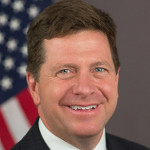Financial Restructuring and Banking Partners Join Barnes & Thornburg
Barnes & Thornburg LLP has added financial restructuring and banking attorneys Thomas Hoffman and Michael Cavallaro as partners in the firm’s Minneapolis office.
Hoffman and Cavallaro have almost 30 years of in-house bank counsel experience, including indenture trustee representation, restructuring work and bank advisory and regulation advice, the firm said in a news release.
“As we approach our tenth year in Minneapolis, we’re continuing to attract the best legal talent in the region, while also putting our people in positions to provide valuable counsel and services to clients, both in the Twin Cities and other markets, and take advantage of our national platform,” said Connie Lahn, managing partner of Barnes & Thornburg’s Minneapolis office. “In Mike and Tom, we’ve added two highly respected, dynamic attorneys with decades of banking and financial services experience.”
“Mike and Tom bring invaluable in-house experience and are well-regarded by their peers and the broader business and legal communities in Minneapolis,” said David Gotlieb, chair of Barnes & Thornburg’s Corporate Department. “Their arrival underscores the concerted effort we’re making to grow this office and our larger corporate group with practitioners who can best address the increasing regulatory and compliance challenges facing large financial institutions.”
The pair, who was previously at Fox Rothschild, will be members of the Corporate Department.
Barnes & Thornburg has seen an influx of lateral growth with a group of four partners who launched the firm’s Family Law group in the Minneapolis office: Karen Schreiber, Sonja Trom Eayrs, Brittany Stephens Pearson, and Gloria Myre. Bruce Little, an intellectual property partner, also joined in Minneapolis in the first four days of the year. Barnes & Thornburg’s Minneapolis office, which opened in 2009, now has increased its attorney ranks to 32.
About the Attorneys
Thomas Hoffman has more than 34 years of experience in the financial services industry as a consumer regulatory and compliance attorney and as a commercial financial restructuring and bankruptcy attorney. In the consumer space, he concentrates on default servicing, consumer regulatory and compliance issues, foreclosure, and secured and unsecured claims. In his commercial practice, he represents national banks, trustees, and other creditors in financial restructuring and bankruptcy cases. Earlier in his career, Hoffman worked for more than 25 years as an in-house attorney at Wells Fargo & Company and became a managing counsel.
Hoffman received his J.D. from the Mitchell Hamline School of Law, cum laude, and his B.A. from the University of Minnesota.
Michael Cavallaro focuses his practice on advising banks and financial services companies on national and regional consumer regulatory and legal compliance issues related to consumer and commercial bankruptcy and restructuring, collections, vendor management, foreclosure, loss mitigation and default servicing. His representation of financial institutions includes credit unions, community and national banks, and mortgage servicing companies. Cavallaro also served as the U.S. Trustee Single Point of Contact for one of the top five largest financial institutions in the country, in addition to having worked as senior corporate counsel at U.S. Bank.
Cavallaro received his J.D. from the Mitchell Hamline School of Law, and his B.A., cum laude, from Gustavus Adolphus College.





